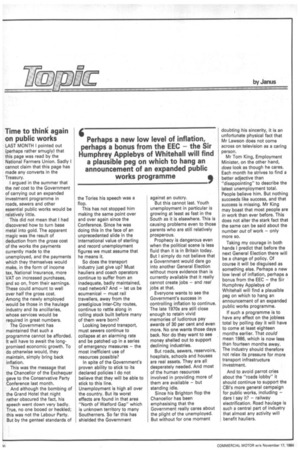Perhaps a new low level of inflation, perhaps a bonus
Page 62

If you've noticed an error in this article please click here to report it so we can fix it.
from the EEC — the Sir Humphrey Applebys of Whitehall will find a plausible peg on which to hang an announcement of an expanded public works programme Time to think again on public works
LAST MONTH I pointed out (perhaps rather smugly) that this page was read by the National Farmers Union, Sadly I cannot claim that this page has made any converts in the Treasury.
I argued in the summer that the net cost to the Government of carrying out an expanded investment programme in roads, sewers and other essential public works would be relatively little.
This did not mean that I had discovered how to turn base metal into gold. The apparent magic was the result of deduction from the gross cost of the works the payments currently made to the unemployed, and the payments which they themselves would make, in the form of income tax, National Insurance, more VAT on increased purchases, and so on, from their earnings. These could amount to well over half the gross cost.
Among the newly employed would be those in the haulage industry and its ancillaries, whose services would be required in great numbers.
The Government has maintained that such a programme cannot be afforded. It will have to await the longpromised economic growth. To do otherwise would, they maintain, simply bring back inflation.
This was the message that the Chancellor of the Exchequer gave to the Conservative Party Conference last month.
And although the bombing of the Grand Hotel that night rather obscured the fact, his speech went down very badly. True, no one booed or heckled; this was not the Labour Party. But by the genteel standards of the Tories his speech was a flop.
This has not stopped him making the same point over and over again since the Conference. Since he was doing this in the face of an unprecedented slide in the international value of sterling and record unemployment figures we must assume that he means it.
So does the transport industry just give up? Must hauliers and coach operators continue to suffer from an inadequate, badly maintained, road network? And — let us be ecumenical — must rail travellers, away from the prestigious Inter-City routes, continue to rattle along in rolling stock built before many of them were born?
Looking beyond transport, must sewers continue to collapse at an alarming rate and be patched up in a series of emergency measures — the most inefficient use of resources possible?
In spite of the Government's proven ability to stick to its declared policies I do not believe that they will be able to stick to this line. Unemployment is high all over the country. But its worst effects are found in that area "North of Watford Gap" which is unknown territory to many Southerners. So far this has shielded the Government against an outcry.
But this cannot last. Youth unemployment in particular is growing at least as fast in the South as it is elsewhere. This is causing problems even to those parents who are still relatively prosperous.
Prophecy is dangerous even when the political scene is less fluid than it is in Britain today. But I simply do not believe that a Government would dare go into another General Election without more evidence than is currently available that it really cannot create jobs — and real jobs at that.
Everyone wants to see the Government's success in controlling inflation to continue. The late 1970s are still close enough to retain vivid memories of ludicrous pay awards of 30 per cent and even more. No one wants those days back. Nor do they want to see money shelled out to support declining industries.
But roads, sewers, reservoirs, hospitals, schools and houses are real assets. They are all desperately needed. And most of the human resources involved in providing more of them are available — but standing idle.
Since his Brighton flop the Chancellor has been emphasising that the Government really cares about the plight of the unemployed. But without for one moment doubting his sincerity, it is an unfortunate physical fact that Mr Lawson does not come across on television as a caring person.
Mr Tom King, Employment Minister, on the other hand, does look as though he cares. Each month he strives to find a better adjective than "disappointing" to describe the latest unemployment total. People believe him. But nothing succeeds like success, and that success is missing. Mr King may boast that most people are in work than ever before. This does not alter the stark fact that the same can be said about the number out of work — only more so.
Taking my courage in both hands I predict that before the next General Election there will be a change of policy. Of course it will be disguised as something else. Perhaps a new low level of inflation, perhaps a bonus from the EEC — the Sir Humphrey Applebys of Whitehall will find a plausible peg on which to hang an announcement of an expanded public works programme.
If such a programme is to have any effect on the jobless total by polling day it will have to come at least eighteen months earlier. That could mean 1986, which is now less than fourteen months away. The industry should therefore not relax its pressure for more transport infrastructure investment.
And to avoid parrot cries about the "roads lobby" it should continue to support the CBI's more general campaign for public works, including — dare I say it? — railway electrification. Road haulage is such a central part of industry that almost any activity will benefit hauliers.












































































































